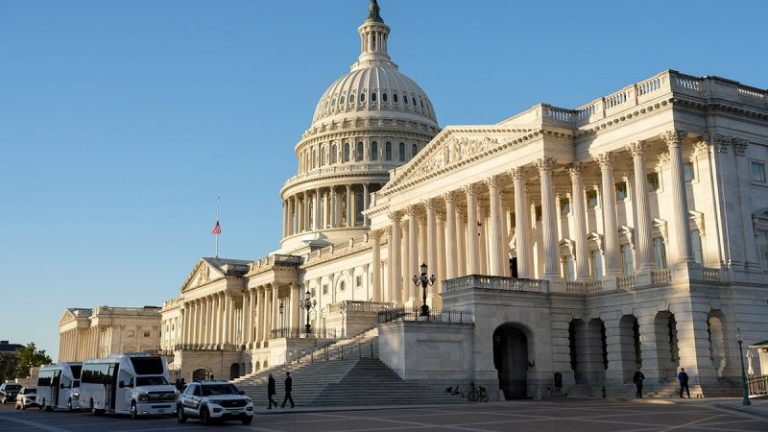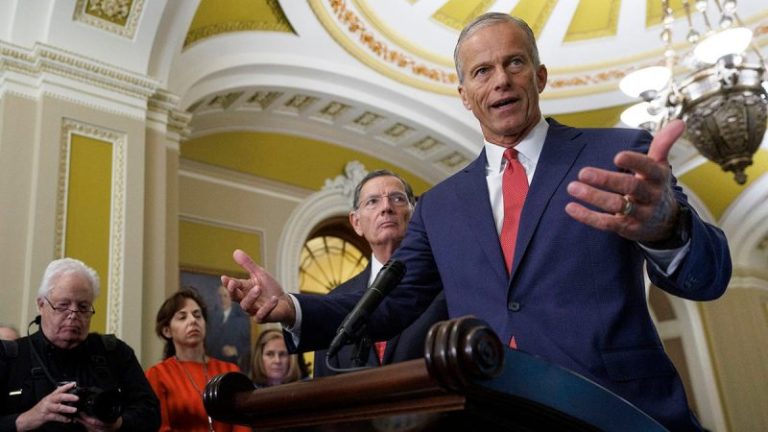The chair of the House Republican campaign arm says the Democrats’ sweeping victories in this month’s 2025 elections are a ‘wake-up call’ for GOP voters.
And Rep. Richard Hudson of North Carolina, who’s chairing the National Republican Congressional Committee for a second straight election cycle, said in an exclusive interview with Fox News Digital that he wants President Donald Trump ‘out there on the trail’ in next year’s midterm elections, when the party defends its razor-thin House majority.
Democrats won the only two races for governor this year, in New Jersey and Virginia, by double digits, and also scored big wins in ballot box showdowns in battlegrounds Georgia and Pennsylvania and left-tilting New York City and California.
Plenty of Republicans have discounted the Democrats’ high-profile victories, since they mostly occurred in blue-leaning states, since they mostly occurred in blue-leaning states.
Hudson noted the top elections took place in ‘Democrat states,’ but added, ‘I think our big takeaway as Republicans is the Democrats were energized. They turned out at record levels. Republicans turned out in normal levels.’
‘I think there’s a wake-up call there to conservatives and Republicans who are happy with the direction of the country. They’re glad President Trump’s back in the White House. But if they want to keep this momentum going, they’ve got to show up and vote,’ he emphasized.
Many of Trump’s MAGA supporters are considered low-propensity voters, who head to the polls only when Trump is on the ballot. But Trump won’t be on the ballot in the 2026 midterms.
Hudson, who noted that ‘House Republicans are very closely aligned with President Trump, and we’re supporting his agenda,’ said that ‘we want him out there on the trail, campaigning with our candidates. I think he brings a lot of energy.’
Pointing to ‘a lot of folks who don’t vote when he’s not on the ballot,’ Hudson said, ‘I don’t need all of them to show up, but I need some of them. And so having President Trump out there will be a big benefit for us.’
Those requests for the MAGA motivator are already coming in to the president’s political team.
Matt Van Epps, the Republican nominee in next month’s special congressional election for a vacant GOP-held House seat in Tennessee, has asked for Trump to campaign in person with him ahead of the Dec. 2 election.
Democrats were laser-focused on affordability on the 2025 campaign trail.
Democratic National Committee Chair Ken Martin said his party’s candidates met ‘voters at the kitchen table. . . . From New Jersey and Virginia and New York, to Georgia and beyond, Democrats ran campaigns relentlessly focused on costs and affordability.’
And Martin emphasized the 2025 elections were a preview of things to come in next year’s midterms.
‘In ‘26, we’ll do it again. We’ll run a National Coordinated Campaign to win races up and down the ballot to provide a check on the out-of-control Trump administration and its Republican rubber stamps,’ he argued.
Hudson, pointing to former President Joe Biden, said ‘there are challenges out there with the economy, because Biden broke it, and House Republicans, working with President Trump, are going to fix it, and we’re working very hard to do that. ‘
‘Certainly, we could always improve the way we communicate with our voters about it,’ he added. ‘But we are laser focused on the issues that matter to them. You know, it’s the cost of things, it’s the security in their neighborhood, it’s a secure border. We are very focused on that, and we’ve delivered a lot of things that are going to make their lives better.’
And looking ahead to next year, he added, ‘come tax season, a lot of families are going to be really happy to see they’ve got a lot more take-home pay, and that’s because of Donald Trump and House Republicans.’
Hudson, in step with fellow Republicans, aimed to link Mayor-elect Zohran Mamdani, a socialist who pushed a far-left platform on the campaign trail this year, to House Democrats who may face challenging re-elections next year.
‘The entire Democrat Party has shifted to the left. This is Mamdani’s party now,’ Hudson charged. ‘And every single House Democrat needs to answer for his policies, and they need to let their constituents know, do they stand with Mamdani or not?’
The power in power, which nowadays is clearly the Republicans, traditionally faces political headwinds in the midterm elections.
And Hudson was interviewed as two new national polls indicated Democrats with the upper hand in the 2026 battle for the House majority.
But Hudson said: ‘The only number I’m concerned about is three. We have three Republicans in seats Kamala Harris carried.’
And he highlighted that Democrats have ‘thirteen sitting in seats Donald Trump won. They’ve got 21 more sitting in seats that Donald Trump barely lost. So there, there are only a few seats up for grabs this time, most of them are Democrat seats.’










